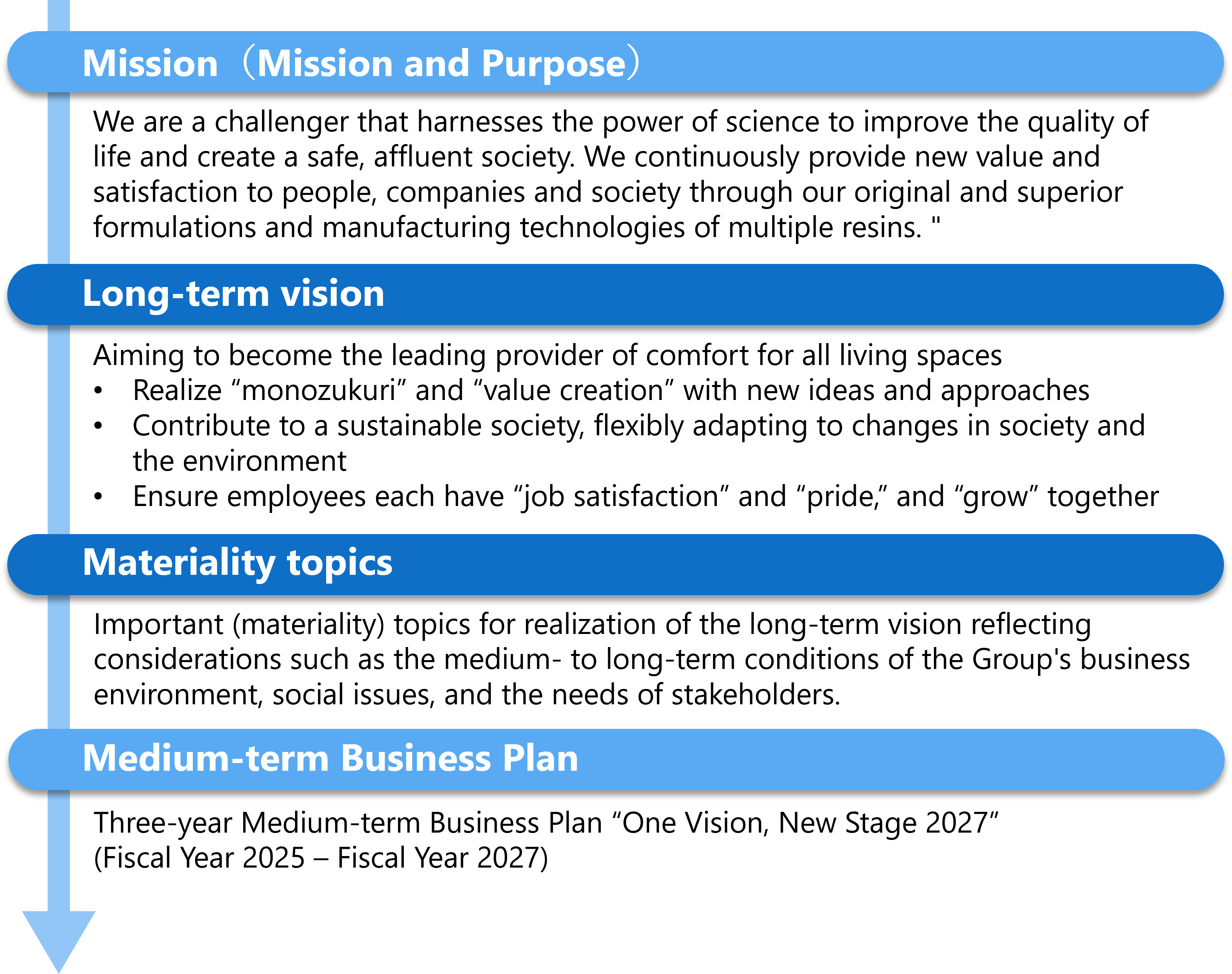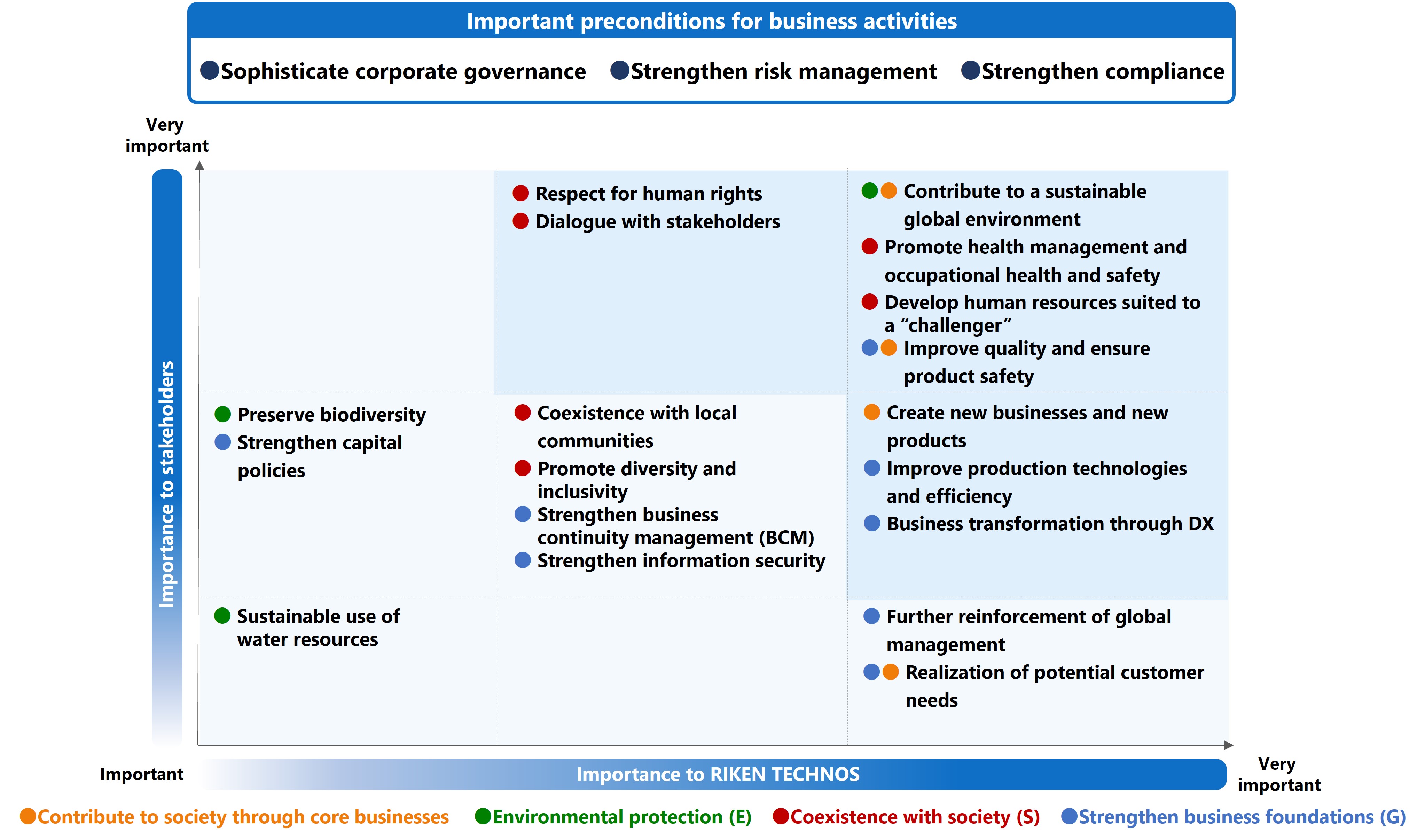Sustainability
Materiality Topics
We identify important topics as materiality toward realization of the long-term vision, reflecting considerations such as the medium- to long-term conditions of the Group’s business environment, social issues, and the needs of stakeholders.
Amidst a drastically changing business environment the Group has been working to achieve its long-term vision, “aiming to become the leading provider of comfort for all living spaces” since 2016, and has formulated a medium-term business plan and strategy, and is implementing a variety of measures.
The long-term vision incorporates the concept of delivering optimal solutions (comfort) through our businesses to “all living spaces,” including those areas of society we will become involved with in the future, in addition to existing business areas and stakeholders.
The RIKEN TECHNOS GROUP recognizes that responding to issues surrounding sustainability is important. By incorporating these issues into our management, we seek to help realize a sustainable society and enhance our enterprise value.

Process of Identification of Materiality Topics
Materiality topics were identified through companywide discussion of topics that should be addressed, based on analysis and review of changes to the Group's business environment, social issues, and stakeholder needs. The Sustainability Committee manages the progress on materiality topics identified.
Step 1: Reviewing environmental changes, social issues, and stakeholder needs
The Sustainability Committee secretariat, which comprises members selected from the respective divisions, played a central role in identifying relevant key topics with reference to various guidelines, key performance indicators (KPIs), and other information regarding the Sustainable Development Goals (SDGs) and the environment, society, and governance (ESG) to review changes to the Groupʼs medium- to long-term business environment, social issues, and needs of stakeholders and others.
Step 2: Candidate selection
Candidate materiality topics for the Group to address were selected based on the key topics identified.
Step 3: Candidate evaluation
The candidate topics selected were assessed for materiality along the two axes of importance to the Group and importance to stakeholders.
Step 4: Deliberation at the various levels
Roundtable discussions were held among directors and executive officers for identification of materiality topics by management, including outside directors. Participants discussed the individual candidate materiality topics and their importance.
Similar discussions were held in roundtable talks by department managers and those in equivalent posts.
Step 5: Preparation of materiality matrix
Based on the details of the discussions above, the Sustainability Committee revised and made additions to candidate materiality topics and prepared a materiality matrix.
Step 6: Approval of materiality topics by management
The content of the materiality matrix identified was approved by the Board of Directors.
Materiality Matrix and KPIs
We carried out evaluations in terms of importance to the Group and importance to stakeholders and prepared a materiality matrix. In March 2025, we reviewed some of our materiality topics and established indicators and targets (KPIs) for twelve of the selected materiality items that the Group considers are of particular importance.
We are working to achieve our targets, and by managing our progress, we repeat the plan-do-check-act (PDCA) cycle and strive to realize the long-term vision.
Materiality Matrix

| Materiality Topics | Standards for Evaluation (KPIs) | Medium- to Long-term Targets | Relevant SDGs | |
|---|---|---|---|---|
| FY2027 | FY2030 | |||
| Contribute to a sustainable global environment | Achieving CO2 emissions reduction targets for 2030 (non-consolidated) | 29,792 t | 24,139 t (46.2% decrease compared to FY2019) |
|
| Carbon neutral by 2050 (Group) | - | - | ||
| Ratio of total waste to total production (non-consolidated) | 3.2% or less | 3.0% or less | ||
| Promote health and productivity management | Occupational injuries requiring time off work (domestic) | 0 | 0 |
|
| Achieve recognition under KENKO Investment for Health program | Achieve recognition | Maintain recognition | ||
| Develop human resources suited to a “challenger” | Training cost per employee (non-consolidated) | 160,000 yen | 200,000 yen |
|
| Percentage of positive responses to applicable questions in employee awareness survey (non-consolidated) | 70% | 75% | ||
| Improve quality and ensure product safety | Serious quality incidents requiring recalls (non-consolidated) | 0 | 0 |
|
| Serious violations of legal and regulatory compliance regarding use of chemical substances (non-consolidated) | 0 | 0 | ||
| Create new businesses and new products | Numbers of patents applications (non-consolidated) | 75 (cumulative) (FY2025–2027) |
210 (cumulative) (FY2022–2030) |
|
| Ratio of new product sales (non-consolidated and overseas manufacturing subsidiaries) | 23% | 25% | ||
| Improve production technologies and efficiency | Production capacity (non-consolidated) | +11% (vs. FY2021) |
+15% (vs. FY2021) |
|
| Transform business through DX | Development of MI human resources*1 (non-consolidated) | 15 employees | 20 employees |
|
| Participation in DX training (non-consolidated) | 100% | 100% | ||
| Improve employee engagement | Engagement score (ratio of positive responses) (non-consolidated) | 60% | 70% |
|
| Promote diversity, equity and inclusion (DE&I) | Ratio of global human resources*2 in management positions (Group) | 24% | 26% |
|
| Ratio of women in management positions (Group) | 20% | 22% | ||
| Respect for human rights | Penetration of respect for human rights (non-consolidated) | Improvement (vs. FY2025) |
Improvement (vs. FY2027) |
|
| Implementation of human rights due diligence for suppliers and 100% improvement rate (non-consolidated) | 100% | 100% | ||
| Dialogue with stakeholders | Meetings with investors and existing shareholders (non-consolidated) | 190 | 220 |
|
| Assessment response rate*3 regarding customer satisfaction survey results (non-consolidated) | 100% | 100% | ||
| Stable supply of products | Understanding of core product supply risks and determination/implementation of policies (non-consolidated) | Understanding of core product supply risks and determination/implementation of policies | Strengthening of risk controls for core products |
|
*1Human resources that can provide guidance on MI
*2Human resources with at least one year of experience working outside country of birth
*3Ratio of customers for which improvements have been completed, out of the customers for which response is assessed to be necessary
| Materiality Topics | Standards for Evaluation (KPIs) | Results | Medium- to Long-term Targets | Relevant SDGs |
|---|---|---|---|---|
| FY2024 | FY2024 | |||
| Contribute to a sustainable global environment | Achieving CO2 emissions reduction targets for 2030 (non-consolidated) | 38,017 t (46.2% decrease compared to FY2019) |
35,446 t |
|
| Carbon neutral by 2050 (Group) | - | - | ||
| Ratio of total waste to total production (non-consolidated) | 3.3% | 3.3% or less | ||
| Promote health and productivity management | Occupational injuries requiring time off work (domestic) | 1 | 0 |
|
| Percentage of employees undergoing specified health examinations (domestic) | 89.8% | 90% | ||
| Percentage of employees provided specified health guidance (domestic) | 66.7% | 55% | ||
| Develop human resources suited to a “challenger” | Training cost per employee (non-consolidated) | 133,000 yen | 117,000 yen |
|
| Improve quality and ensure product safety | Serious quality incidents requiring recalls (non-consolidated) | 1 | 0 |
|
| Serious violations of legal and regulatory compliance regarding use of chemical substances (non-consolidated) | 0 | 0 | ||
| Create new businesses and new products | Numbers of patents applications (non-consolidated) | 52 (cumulative) (FY2022–2024) |
45 (cumulative) (FY2022–2024) |
|
| Numbers of collaborations with external parties (non-consolidated) | 13 (cumulative) (FY2022–2024) |
10 (cumulative) (FY2022–2024) |
||
| Improve production technologies and efficiency | Production capacity (non-consolidated) | +5% (vs. FY2021) |
+10% (vs. FY2021) |
|
| Business transformation through DX | Development of Ml human resources (non-consolidated) | 9 persons | 9 persons |
|
| DX training for all employees (non-consolidated)*1 | 98% attendance | 100% attendance | ||
| Respect for human rights | Human rights and compliance training for all employees (domestic)*1 | 100% attendance | 100% attendance |
|
| Conduct ESG survey to suppliers (non-consolidated) | Once | Once | ||
| Dialogue with stakeholders | Meetings with investors and existing shareholders (non-consolidated)*2 | 169 companies | 140 or more companies |
|
| Conduct satisfaction survey to customers and suppliers (non-consolidated) | Once | Once |
*1Including attendees of on-demand training
*2Total number of companies